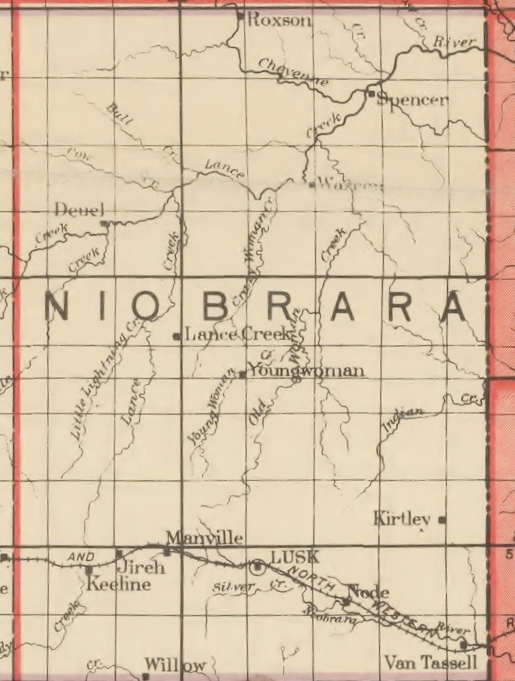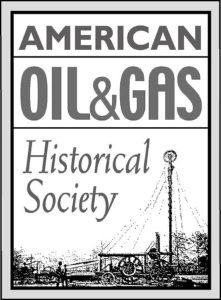 As early as September 24, 1917, the trade journal Oil, Paint, and Drug Reporter reported that Clark Producing & Refining Company would be drilling a well on the “Old Woman Creek dome, adjoining the Norbeck-Nicholson holdings,” about 35 miles north of Lusk,Wyoming.
As early as September 24, 1917, the trade journal Oil, Paint, and Drug Reporter reported that Clark Producing & Refining Company would be drilling a well on the “Old Woman Creek dome, adjoining the Norbeck-Nicholson holdings,” about 35 miles north of Lusk,Wyoming.
The journal added the company held “acreage to the amount of 5,560 acres, and has two additional drilling outfits in transit for work as soon as they arrive on the property.”
The first Wyoming oil wells had arrived in 1890 near ancient “tar springs” north of Casper. Although Clark Producing & Refining’s leases were to east, near the border with Nebraska, the company was enthusiastically endorsed by newspapers, trade journals, and in advertisements soliciting investors.
In Lead, South Dakota, a quarter-page ad in the Lead Daily Call proclaimed in bold print “a harvest of profit awaits the investor in the Clark Producing & Refining Co.” and described holdings of more than 6,000 acres “in the heart of the Old Woman Creek Dome in the North Lusk Oil Field.”
The ad also promoted the company’s leases adjoining a 1916 local sensation, the Norbeck-Nicholson well at Cow Gulch. With one Clark Producing & Refining well about to be spudded (begin drilling) and a second rig planned, potential investors were advised to buy stock at only 26 cents per share to insure “Quick Profits.”
Drilling began on the company’s first well on Old Woman Creek in the southwest of the northwest quarter of Section 10, Township 36 North, Range 62 West. This lease location, described in Public Land Survey System terms, can be viewed in Google Earth and similar applications.
To fire the steam boilers to begin “making hole,” teamsters for Clark Producing & Refining’s hauled fuel oil from the Mule Creek field, about 15 miles to the northeast. By January 1918, a company rig had reached 1,200 feet deep.
When the Lusk Stock Exchange opened in February, Clark Producing & Refining was the first local petroleum stock to be placed on sale (see also the “Curb Market” described in Consolidated Petroleum Company). Drilling on the “Old Woman” well would continue into April 1922 as the company looked for more lease opportunities.
“COW GULCH STILL ALIVE,” proclaimed the Lusk Standard of November 26, 1920. The Oil Distribution News also reported events, noting, “The Clark Producing & Refining Co., composed mainly of Lusk citizens, is making headway with a test of the Young Woman dome, material has been assembled, and gas piped from the so called ‘Cow Gulch’ well completed some time ago by Norbeck and Nicholson.”
Powered by gas-fired boilers, drilling of the “Young Woman” well began. But at 1,472 foot depth, water intrusion into the well bore ruined the attempt. Meanwhile, the “Old Woman” well reached 1,900 feet deep and found a “considerable showing” of natural gas.
Managing multiple operations consumed Clark Producing & Refining Company’s the company’s rigging, equipment and casing supplies without yielding oil. In March 1922, National Petroleum News noted the company’s slow progress at the “Old Woman,” but predicted drilling would begin again “as soon as road conditions to the region are improved.”
A month later, Clark Producing & Refining was the only company still drilling in the eastern part of the Lusk oilfield, the other exploration companies having chased oil strikes further west into the Lance Creek field.
The company decided to use a down-hole explosive to “shoot” the “Old Woman” well at 2,100 feet deep to stimulate oil production, but fracturing did not succeed. The well “reached a depth of 2,160 feet when shut down for the winter. It is now waiting for the roads to become passable so as to move in fuel oil from the Mule Creek field.” No reports followed to indicate drilling ever began again. Like many of its contemporary high-risk petroleum ventures, Clark Producing & Refining likely just ran out of money.
___________________________________________________________________________________
The stories of exploration and production companies joining petroleum booms (and avoiding busts) can be found updated in Is my Old Oil Stock worth Anything? The American Oil & Gas Historical Society preserves U.S. petroleum history. Please support this AOGHS.ORG energy education website. For membership information, contact bawells@aoghs.org. © 2018 Bruce A. Wells.
___________________________________________________________________________________

